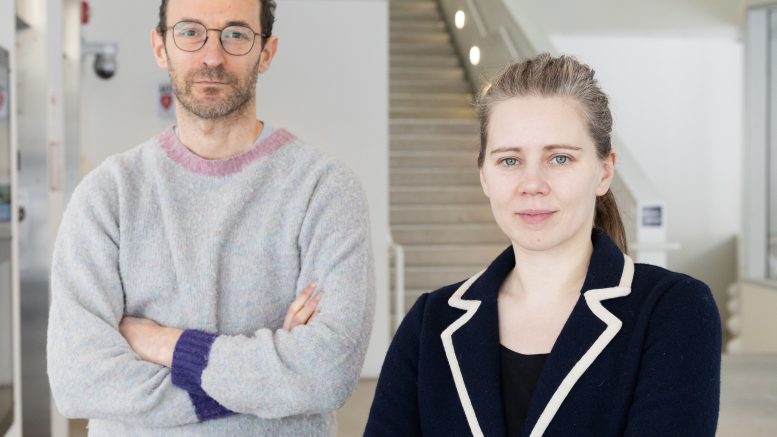Obsession with communication and connection to diasporic cinema are concepts U of M scholars Jonah Corne and Monika Vrečar explore in their newly published monograph, Yiddish Cinema: The Drama of Troubled Communication. Corne and Vrečar are launching their book as a part of the Put a Yid on It! Festival of New Yiddish Culture, which takes place from Feb. 7 to Feb. 11.
Corne, an associate professor in the department of English, theatre, film and media, and Vrečar, independent scholar with a PhD in philosophy and theory of visual culture from the University of Primorska currently teaching at the U of M’s school of art, came together in this project to re-examine what is described as the “golden-age” of Yiddish cinema and the thread of a theme that ties them all together: communication.
Corne expressed that, while there are many different stories he could tell about the origins of the project, one that comes to mind involves his upbringing and the films he watched about Jewish culture in his youth.
“I grew up going to Jewish school and really the overwhelming majority of exposure to ‘Jewish film’ or ‘films about Jews’ that I had was basically through Holocaust movies.”
After discovering Yiddish films, which were made before the Second World War, he began to hunt down more.
“They’re really striking, because they’re — in many ways, at least the ones made in Europe — are about the lifeworld that had been decimated in the Holocaust, which was something that you heard less about than the actual decimation,” Corne said.
“I think that’s probably one of the origin points that it just felt like, this whole question of Jews and cinema or Jewish cinema, there was kind of an imbalance there,” he said.
“And I just wanted to go further into this quite obscure ‘ethnic, diasporic, very minor, often very independent’ cinema.”
The book is described as a conversation of sorts between Yiddish cinema and the ideas of Jewish media theorist Vilém Flusser, who was born in Czechoslovakia and later settled in Brazil after the Nazi occupation of his homeland.
Vilém Flusser is a familiar figure in Vrečar’s life. More than a decade ago she had been writing a PhD on Flusser and the Canadian theorist and U of M alumnus Marshall McLuhan. She met Corne and began to learn about “other dimensions of Jewish culture” due to their companionship.
By the time Corne had expressed potentially writing the book, the two of them had been watching films together and discussing them. After one particular session, Vrečar was struck by a pattern throughout the films — they all had “an obsession with communication.”
“It kind of just happened, that we started to write it together,” Vrečar said.
“I decided that when we had all these conversations, and you know, I had more knowledge on media theory at the time and Jonah obviously had more knowledge on film and just Jewish culture.”
For both authors, the project would be an “interesting collaboration,” Vrečar added.
The films the book focuses on range from the 1930s to the late 40s, as Yiddish cinema past this point is not exactly scarce, but not what it once was.
Both authors believe that this is due to the Yiddish language itself not being as spoken as widely as it was prior to the Holocaust. They explained that the decimation of Jewish diaspora essentially changed Yiddish-speaking communities.
Corne expressed that he and Vrečar noticed a resonance with Yiddish cinema and other diasporic films, which he said had “grown exponentially” since the Second World War.
He said that Yiddish cinema is a sort of early example of films made by diasporic directors making films about assimilation, immigration and migration struggles.
“All of that is in Yiddish Cinema.”
Putting together a book faithfully examining a history as complex as this would be no simple task. Vrečar said that the initial idea itself was “amazing,” but the execution was what was challenging.
“These kinds of projects, they’re a lot of hard work and struggle and you know, the fun part is basically figuring things out, “ she said.
“When you get the idea and it works, that’s amazing, right? When you’re like ‘oh my God, this works now’ and that feels great.”
The book launch for Yiddish Cinema: The Drama of Troubled Communication will be held Feb. 7 at 61 Sherbrook Street at Handsome Daughter and will be free to attend with a reception and presentation alongside drinks and snacks.


